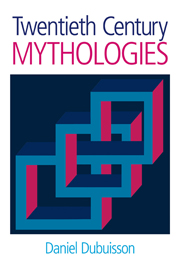Book contents
- Frontmatter
- Epigraph
- Contents
- Foreword by Professor Robert A. Segal
- Preface
- Abbreviations
- Introduction: History and comparative epistemology
- Part I Georges Dumézil, or Society
- Part II Claude Lévi-Strauss, or the Mind
- Part III Mircea Eliade, or the Sacred
- 12 Fascism and mysticism
- 13 Primitive ontology
- 14 The eternal return of anti-Semitism
- 15 The neo-paganism of homo religiosus
- 16 Metaphysics and politics: Eliade and Heidegger
- Addendum III Esotericism and fascism
- Addendum IV The reconstruction of prehistoric religions
- Addendum V The Eliadean conception of symbolism
- Addendum VI Forgetting the Shoah
- Conclusion: Modern theories of myth and the history of Western thought
- Bibliography
- Index
16 - Metaphysics and politics: Eliade and Heidegger
from Part III - Mircea Eliade, or the Sacred
- Frontmatter
- Epigraph
- Contents
- Foreword by Professor Robert A. Segal
- Preface
- Abbreviations
- Introduction: History and comparative epistemology
- Part I Georges Dumézil, or Society
- Part II Claude Lévi-Strauss, or the Mind
- Part III Mircea Eliade, or the Sacred
- 12 Fascism and mysticism
- 13 Primitive ontology
- 14 The eternal return of anti-Semitism
- 15 The neo-paganism of homo religiosus
- 16 Metaphysics and politics: Eliade and Heidegger
- Addendum III Esotericism and fascism
- Addendum IV The reconstruction of prehistoric religions
- Addendum V The Eliadean conception of symbolism
- Addendum VI Forgetting the Shoah
- Conclusion: Modern theories of myth and the history of Western thought
- Bibliography
- Index
Summary
Eliade read Heidegger and, with his inimitable way of pleading for his own genius in every situation, congratulated himself on the fact that Heidegger had espied certain truths that formed the basis of his own particular conception of the world (MDM, 239; FJ1, 437 and elsewhere). Even though mistaking the meaning of some technical terms from the Heideggerian lexicon, Eliade “recycled,” via his own system, the terms “Urgrund,” “modes d'être,” and “ontic.”
Most important, however, both of these men lived through the 1930s and kept company with organizations and ways of thinking – Nazism for Heidegger and the Romanian Legionary movement for Eliade – so that, whatever their differences, they were alike in their condemnation of democracy, the modern scientific world, progress (social and technical), and free thinking. This was in the name of an obscure metaphysics of Being, an aristocratic, anachronistic elitism, an agrarian mysticism that promoted archaism, and a verbose exaltation of the Volk, the people: a metaphysics they claimed to be solidly rooted in the earth and thus preserving traditional virtues.
After the war, in all the thousands of pages they published, Eliade and Heidegger never tried to re-examine their political and intellectual engagements, much less to deny them. It is true that such a step would certainly have led to uncovering the solid affinities between their own thoughts and those that would give birth to Romanian and German anti-Semitism.
- Type
- Chapter
- Information
- Twentieth Century Mythologies , pp. 233 - 242Publisher: Acumen PublishingPrint publication year: 2006



